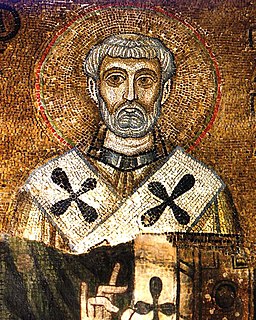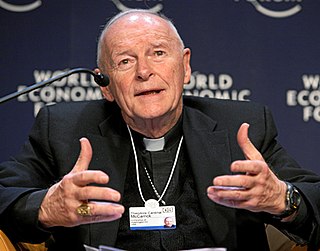A Quote by Saint Francis de Sales
All true and living devotion presupposes the love of God and indeed it is neither more nor less than a very real love of God, though not always of the same kind; for that Love one while shining on the soul we call grace, which makes us acceptable to His Divine Majesty; when it strengthens us to do well, it is called Charity; but when it attains its fullest perfection, in which it not only leads us to do well, but to act carefully, diligently, and promptly, then it is called Devotion.
Related Quotes
In so far as divine love beautifies our souls. And makes us pleasing to His divine Majesty, it is called grace; in so far as it gives us strength to do good, it is called charity; but when it reaches such a degree of perfection, that it makes us not only do the good, but do so carefully, frequently and readily, then it is called devotion.
This is the amazing story of God’s grace. God saves us by His grace and transforms us more and more into the likeness of His Son by His grace. In all our trials and afflictions, He sustains and strengthens us by His grace. He calls us by grace to perform our own unique function within the Body of Christ. Then, again by grace, He gives to each of us the spiritual gifts necessary to fulfill our calling. As we serve Him, He makes that service acceptable to Himself by grace, and then rewards us a hundredfold by grace.
The love of God is not taught. No one has taught us to enjoy the light or to be attached to life more than anything else. And no one has taught us to love the two people who brought us into the world and educated us. Which is all the more reason to believe that we did not learn to love God as a result of outside instruction. In the very nature of every human being has been sown the seed of the ability to love. You and I ought to welcome this seed, cultivate it carefully, nourish it attentively and foster its growth by going to the school of God's commandments with help of His grace.
The celebration of Lent, in the context of the Year of Faith, offers us a valuable opportunity to meditate on the relationship between faith and charity: between believing in God - the God of Jesus Christ - and love, which is the fruit of the Holy Spirit and which guides us on the path of devotion to God and others.
God notices you. The fact is he can't take his eyes off of you. However badly you think of yourself, God is crazy about you. God is in love with you. Some of us even fear that someday we'll do something so bad that he won't notice us anymore. Well, let me tell you, God loves you completely. And he knew us at our worst before he ever began to love us at all. And in the love of God there are no degrees, there is only love.
Love can become devotion. Love is the first step; only then can devotion flower. But for us even love is a faraway reality, sex is the only real thing. Love has two possibilities: either it falls into sex and becomes a bodily thing, or it rises into devotion and becomes a thing of the spirit. Love is just in between. Just below it is the abyss of sex, and beyond it is the open sky - the infinite sky of devotion.
God felt, God tasted and enjoyed is indeed God, but God with those gifts which flatter the soul, God in darkness, in privation, in forsakenness, in sensibility, is so much God, that he is so to speak God bare and alone. Shall we fear this death, which is to produce in us the true divine life of grace?
Who can describe the bond of God's love? Who is able to explain the majesty of its beauty? The height to which love leads is indescribable. ... In love the master received us, Jesus Christ our Lord, in accordance with God's will gave his blood for us, and his flesh for our flesh, and his life for our lives.
The experience of not forgetting consciousness alone is the state of devotion which is the relationship of unfading real love, because the real knowledge of Self, which shines as the undivided supreme bliss itself, surges up as the nature of love. Love itself is the actual form of God. That is pure bliss. Call it pure bliss, God, Self, or what you will. That is devotion, that is realization and that is everything.
Our redemption through the suffering of Christ is that deeper love within us which not only frees us from slavery to sin, but also secures for us the true liberty of the children of God, in order that we might do all things out of love rather than out of fear - love for him that has shown us such grace that no greater can be found.
Divine love makes us true to ourselves and to others...
Divine love is the solution to our difficulties and problems.
It frees us from every kind of binding.
It makes us speak truly, think truly, and act truly.
It makes us feel one with the whole universe.
Divine love purifies our hearts and glorifies our being.
If it were not for the Eucharist, if it were not for this marvelous manifestation of God's love, if it were not for this opportunity to place ourselves in the very real presence of God, if it were not for the sacrament that reminds us of His love, His suffering and His triumph, which indeed perpetuates for us His saving sacrifice on the cross, I am sure that I could never face the challenges of my life, my own weakness and sinfulness and my own need to reach out to the Living God.
What I'm most deeply grateful for is that God's love for us, approval of us, and commitment to us does not ride on our resolve but on Jesus' resolve for us. The gospel is the good news announcing Jesus' infallible devotion to us despite our inconsistent devotion to Him. The gospel is not a command to hang on to Jesus; it's a promise that no matter how weak and unsuccessful our faith and efforts may be, God is always holding on to us.
A God who chastises our lack of faith, our vices, the little esteem in which we hold dignity and the civic virtues. We tolerate vice, we make ourselves its accomplices, at times we applaud it, and it is just, very just that we suffer the consequences, that our children suffer them. It is the God of liberty ... who obliges us to love it, by making the yoke heavy for us - a God of mercy, of equity, who while He chastises us betters us and only grants prosperity to him who has merited it through his efforts. The school of suffering tempers, the arena of combat strengthens the soul.
I saw full surely that ere God made us He loved us; which love was never slacked, nor ever shall be. And in this love He hath done all His works; and in this love He hath made all things profitable to us; and in this love our life is everlasting. In our making we had beginning; but the love wherein He made us was in Him from without beginning: in which love we have our beginning. And all this shall we see in God, without end.
God will never disappoint us… If deep in our hearts we suspect that God does not love us and cannot manage our affairs as well as we can, we certainly will not submit to His discipline. …To the unbeliever the fact of suffering only convinces him that God is not to be trusted, does not love us. To the believer, the opposite is true.



































